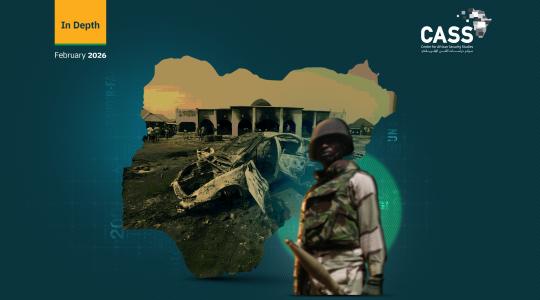On the evening of May 28, gunmen from the Wagner group attacked the Malian village of Mahmoud Al-Mallan, close to the border with Mauritania. The village and the surrounding farmland belong to Mauritanian citizens. The attack left village head Mohamed Ould Sheikh Mohamed Laghdaf dead, along with six of his workers. Another worker escaped and fled to nearby Al-Shantiyya, where he informed the victim’s family of the news.
This was not the first attack by Wagner forces and the Malian army against Mauritanians living in Mali. It followed a string of similar incidents over the course of 2023, targeting border villages and farms inhabited by Mauritanian citizens. The most notorious such operation was in mid-April this year, when Wagner and Malian army forces stormed the Mauritanian villages of Dar Al-Naim and Madallah, in Mauritania’s southeastern state of Hodh Ech Chargui.
Muted Reactions
The Mauritanian government has been surprisingly silent on the Wagner Group’s attacks on Mauritanians within Malian territory. This is despite the deep historical ties some Mauritanians have to the region, especially the Ouled Daoud tribe, which has branches across southeastern Mauritania and northern Mali.
In mid-April, Mauritania banned Malian citizens from entering its territory without a valid residence permit. Mali closed its own borders to Mauritanians on April 16, but the closure only lasted for about a week.
The cross-border attack on the Dar Al-Naim and Madallah prompted the Mauritanian Ministry of Foreign Affairs to summon Mali’s ambassador in Nouakchott on April 19, in protest at attacks on Mauritanians on both sides of the border.
A delegation of senior security and military figures led by Mauritanian Defense Minister Hanena Ould Sidi then visited Mali’s General Assimi Goita, who had seized power in a 2021 coup, to discuss the attacks on Mauritanians by the Wagner Group and the Malian army. On May 5, Mauritanian forces carried out exercises in the area that had been attacked, in the presence of army Chief of Staff Lieutenant General Mokhtar Ould Bolla Ould Chaabane.
Long Border Tensions
The border between Mali and Mauritania extends some 2,236 kilometers (1,389 miles) from the Algerian frontier in the north to Senegal in the southwest. Since 1963, Mauritania has laid claim to large swathes of western Mali, but the two sides had reached a compromise arrangement under which villages inside Mali where Mauritanians lived were placed under Nouakchott’s jurisdiction. Their residents could obtain Mauritanian citizenship and move easily between the two countries.
Former Mauritanian president Maaouya Ould Sid’Ahmed Taya (1984-2005) was keen to naturalize as many members of the Arab tribes residing in Mali as possible. He saw them as a source of strategic depth for Mauritania in Mali, in any potential military conflict between the two countries. In parallel, the two countries launched several major infrastructure projects, such as the Senegal River Basin Development Project and a highway linking Bamako and Nouakchott.
Over the decades, the border region has seen several episodes of tension, most notably in 2010, when relations between the two countries almost broke down after French and Mauritanian forces launched a joint military operation against Al-Qaeda in the Islamic Maghreb (AQMI) fighters inside Mali without the approval of the Malian government. Since 2022, livestock smuggling and attacks on Mauritanians inside Mali have escalated. Wagner became involved in the attacks in 2023, further fueling tensions between the two countries.
Many officials who were involved in the coup in Mali—and who are now part of the Transitional Military Council—hail from the Bambara ethnic group. Bambara herders have long been involved in tit-for-tat attacks with Fulani and Arab pastoralists. Given that the Ouled Daoud is the largest Arab tribe in Mali’s border region with Mauritania, Bambara tribal leaders are reportedly targeting these tribes for evacuation from these areas, in order to expand their own area of influence at the expense of western Mali’s Arab and Fulani tribes.
Bambara sheikhs had addressed previous crises by pledging to Ouled Daoud elders that they would not be repeated, and by paying blood money for those killed. However, the most recent attack on May 28, 14 km into Malian territory, claimed the life of a prominent member of the tribe from eastern Mauritania’s Bassikounou district as he visited his farm in Mali. His execution, along with six of his workers, prompted an exodus of Mauritanian residents from the surrounding villages. In response, notables from the region’s Mauritanian council demanded that their government respond.
Yet sources with knowledge of the affair told the Centre for African Security Studies that Nouakchott had taken no action within the first day of the incident, prompting Mauritanian residents to mobilize of their own accord. On May 29, about 120 gunmen crossed the border into the Marja district, some 130 km into Malian territory, where they attacked a Wagner/Malian army base. A number of them were arrested, others were killed, and the rest withdrew to Mauritania.
Frontier Fallout
This latest iteration of the long-running border crisis between Mali and Mauritania could have serious repercussions for both countries, especially in light of successive coups in Bamako that overthrew President Ibrahim Boubacar Keïta in 2020 and interim President Bah Ndaw in 2021.
The second coup brought to power a “transitional” council that has adopted hostility to the West, particularly France, as a pillar of its ideology and a strategic goal, turning instead to Russia (as did juntas that took power in previous coups in Niger and Burkina Faso), giving Moscow a distinct position of influence in West Africa.
Bamako has also sought help from Wagner mercenaries, who have become the spearhead of the campaign to purge western Mali of Mauritanians. This in turn wracks up the pressure on Mauritania to cease its cooperation with Europe and deprive NATO of a strategic location on the Atlantic coast. Furthermore, it could affect Mauritania’s efforts to exploit its natural gas reserves and plans for alternative energy projects, with European support, in desert areas.
Given the ongoing attacks by Wagner, it is possible that Mauritanian and Arab tribes will resort to armed pressure against Mali. This could thwart efforts to prevent the two countries being dragged into war. What is more, the situation offers jihadist groups a historic opportunity step up their activities in Mauritania once again, threatening the country’s progress in tackling Al-Qaeda since 2010.
The crisis could also have deep economic repercussions. Mali imports food mainly via the port of Nouakchott and Mauritanian highways, which it also uses to export its own goods—including agricultural goods destined for Mauritania. Further instability could threaten both. Herders in eastern Mauritania and livestock traders could also shortages of fodder and become unable to take their livestock to pasture inside Mali, raising the prospect of the deaths of tens of thousands of camels and cattle.
Mauritania is likely to treat recent developments as major threat to its national security, which could push it to downgrade its relations with Mali and even withdraw its ambassador from Bamako, especially in the case of further violations on Mauritanian territory. However, if the violence is limited to campaigns to displace Mauritanians from their villages in Mali, Nouakchott may take the initiative and demand a return to negotiations over the border between the two countries, all the while maintaining the hitherto calm tone of statements by Mauritanian officials.




